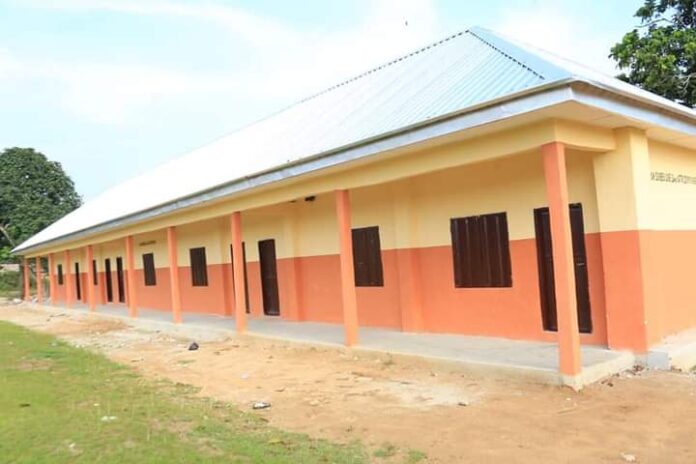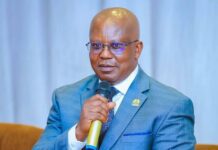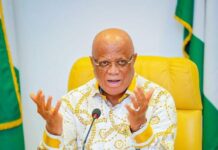A newly renovated classroom block at Primary School, Afaha Ikot Osom in Ibesikpo Asutan local government area. (Credit : Aniekan Uko)
By Abasifreke Effiong & Kufre Etuk.
On January 3, during the 2021 new year solemn assembly and dedication service, Governor Udom Emmanuel announced that changes were afoot in the state education sector which is rimmed by poor infrastructure, inadequate personnel with requisite qualifications, absenteeism and poor supervision, vices, poor motivation and reward system, and generally poor output. He said, “in 2021 we have declared war on education the same way we declared on healthcare in the state before COVID-19. We have been compiling and we are going to launch out aggressively.
“We will start with physical infrastructure, we will train teachers. All secondary schools in Uyo must be fenced round beginning from this January and we will provide security men in those schools to protect the facilities…”
The Governor’s declaration of emergency in the education sector came two months after the state think-tank committee on education chaired by an erudite scholar of global acclaim and famous Professor of Geoenvironmental Engineering, Hillary Inyang, submitted its report which contained findings arrived at through a thorough scientific diagnosis of the festering challenges in the education sector. The report also contained roundabout and farsighted recommendations needed to build an education system that would meet the human capital needs of the state, taking into consideration its economic potentials.
The Prof. Inyang-led committee in November 2020, submitted a-10 year education roadmap for Akwa Ibom state. The roadmap clearly marshals interventions that should be undertaken by the state government to remediate the general deficiencies in the state’s education sector. From personal knowledge of the challenges facing the education sector and the consensus opinions of critical stakeholders in the sector, the committee’s diagnoses and recommendations are better than the best any administration in the state has gotten.
The think-tank committee’s report is as fresh, comprehensive, explicit, and dependable as a polymerase chain reaction (PCR) test for malaria parasite.
What interventions have the state government done at nursery, primary, and secondary levels, five months after the committee’s report? Are these interventions done within the implementation timelines recommended by the think-tank committee? Implementation timelines are important if we must assess the governor’s seriousness, determination and commitment to the state of emergency he declared in the education sector.
• Sum of what the committee said
The recommendations of the state’s think-tank committee on education have a-10 year implementation timeline. Among the short term programmes (covering year 2000 – 2024) recommended by the committee are: remediation in the teaching and teachers’ welfare sector, physical infrastructure improvement programme, equipment and furnishings enhancement, educational programmes and processes improvement systems.
•Remediation in the teaching and teachers’ welfare sector
The committee observed an inadequacy of teaching staff, very high students/teacher ratio (120:1), poorly trained teaching staff, assigning teachers to teach subjects they do not have cognate knowledge in, absence of modern teaching aids, computer illiteracy, poor counselling of students, many non-motivated teaching staff, and inadequate teachers’ welfare programme. Therefore, it recommended the recruitment and training of 2000 teachers for the 252 secondary schools and 3000 teachers for primary schools in the state within eight months from November 2020.
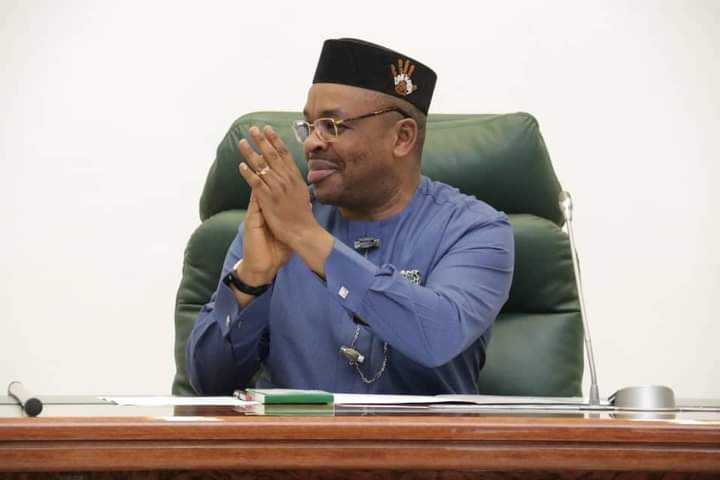 Mr. Udom Emmanuel, Governor, Akwa Ibom state. (Credit : Media unit, AKGH).
Mr. Udom Emmanuel, Governor, Akwa Ibom state. (Credit : Media unit, AKGH).
The committee had made a projection that enrollment in nursery, primary, and secondary schools would hit 3,337,103 in 2021/2022 as against 3,055,881 in 2019/2020, with a concomitant increase in teachers’ employment to 51,373 in 2022, to keep the students/teacher ratio at 60:1 in nursery schools, 80:1 in primary, junior secondary and senior secondary schools, and 60:1 in trade schools. The ultimate target is to reach a ratio of 40:1 by 2030. Consequently, the Akwa Ibom state government has initiated a process to upgrade programmes at the College of Education, Afaha Nsit, to a degree-awarding status, from where it hopes to draw manpower to meet the envisaged rise in personnel need. This is strategic thinking and timely planning.
In line with the committee’s recommendation, the state government has also commenced the process of recruiting 1000 teachers for secondary schools and 1000 for primary schools in the state.
The Commissioner for Education, Mrs. Idongesit Etiebet, in an exclusive interview with this reporter, said that the on-going recruitment of teachers for secondary schools would be based on subject needs.
“We have done needs assessment and we have seen the gaps we have to fill. So, teachers for English language, Mathematics and science subjects would form 80% of those we will recruit”, Mrs. Etiebet said.
READ : Akwa Ibom teachers struggle with more workload after withdrawal of N-POWER teachers
The state government may argue that it does not have the luxury of funds to recruit 2000 teachers for secondary schools and 3000 teachers for primary schools as was recommended. However, the governor can show commitment to the change he promised by ensuring that the recruitment, training, and deployment of the 2000 teachers (1000 each for secondary and primary schools) are done within the implementation timeframe, which is eight months from November 2020.
▪ Physical infrastructure improvement programme
The committee did an audit of infrastructure in public schools in each local government area, focusing on infrastructure type, quality, and condition. For nursery and primary schools, the infrastructure under consideration were: chairs, tables and shelves; laboratory equipment; ICT equipment; factory machines and tools; farming equipment and tools; books; software for computer; sports equipment; and first aid equipment.
For secondary schools, the committee considered: classroom building, administrative building/section, library building, ICT facility, simply paved streets and fence, entrepreneurship shop, school farm, electric power supply, laboratory, borehole/water tank/plumbing, refectory, medical dispensary, school vehicle, sport facility, and health facility.
RELATED STORIES
• 172 retired primary school teachers in Akwa Ibom have received their gratuity
• PWDs still face obnoxious stereotypes in Akwa Ibom – Amnesty groups
Data from the committee’s analysis show that no local government area scored up to 50% average on infrastructure adequacy in both primary and secondary schools categories. This finding prompted the committee to recommend the immediate improvement in physical infrastructure in primary and secondary schools.
The state government has begun an upgrade of physical infrastructure in primary and secondary schools across the state. The interventions cover construction of perimeter fence, renovation of classroom blocks, administration blocks, dinning and assembly halls, construction of boreholes and reticulation for school toilets and supply of desks, etc. The number of these interventions is not known yet because the inter-ministerial direct labour committee coordinating these interventions could not provide data, even after two days, when this reporters asked for it through the Commissioner for Information and Strategy.
Meanwhile, the Commissioner for Education said the perimeter fencing and renovation of classroom blocks would be done in phases till every school is covered.
“The Governor has directed that perimeter fence should be constructed around all schools within Uyo municipality in order to keep our children in an enclosed environment and instill discipline in them, check loitering, encroachment on school land, and theft.
“The perimeter fencing project would be done in phases till all public schools in the state are fenced round. Trust the governor, he has approved infrastructural development in schools in our strategic quest to make school environment conducive for teachers and students”, Mrs. Etiebet said.
The other day, a male passenger in a bus along Oron road, Uyo, where some schools are being fenced round said, “it’s a shame that our government is busy with construction of fence around our schools in this 21st century when they should be providing computers…” The schools need to be secured before computers are provided. There are reported cases of theft and vandalisation of school property. Last year, after the COVID-19 lockdown one of the schools in Etinan local government reported to journalists that thieves vandalised the principal’s office and carted away whiteboards, students’ registers’, office chairs, etc. There are also issues of encroachment on school facilities and invasion of school premises during school hours for the very flimsy purpose of hosting social events. This justifies the need for the fencing project.
The government has done well in carrying out a reasonable number of physical interventions within an implementation timeline of less than five months after the committee submitted her report, the poor quality of some of the interventions notwithstanding. The poor quality of desks delivered to schools under the current batch of intervention has let down government’s commitment to quality delivery and impugn the very essence of the job.
Poor quality jobs fester because the inter-ministerial committee that is coordinating the intervention has failed to actively supervise the jobs to ensure ‘resource persons’ who are mainly politicians comply to quality delivery. In the craze to complete the interventions in record time and maximise profit, it should not be lost on the inter-ministerial committee that quality of infrastructure was one aspect the schools failed in the infrastructure audit and facility rating conducted by the education committee.
The sore state of the existing infrastructure informed the committee’s recommended for ‘furnishings enhancement’. Such enhancement should include provision of durable, high-quality, eco-friendly, and convenient desks for children in schools as against the usual ones, which easily break and are susceptible to high infestation by wood boring insects. If the state government is serious about leaving a legacy in the education sector, her contractors should be told in clear terms that the interventions are part of a 10-year plan aimed to clear deficits, hence, whatever is done should not be “cut and join”.
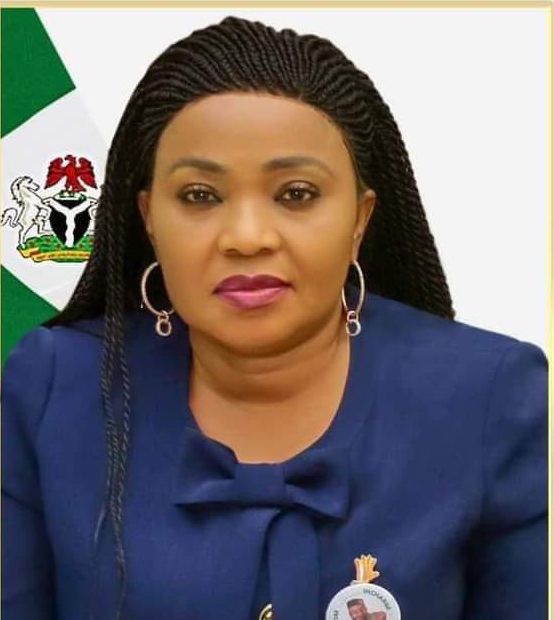 Mrs. Idongesit Etiebet, Commissioner for Education, Akwa Ibom state. (Official photo).
Mrs. Idongesit Etiebet, Commissioner for Education, Akwa Ibom state. (Official photo).
Bearing in mind our peculiarities such as weather conditions, prevalence of wood pests, cases of vandalisation and theft of school desks, government should be thinking of providing immovable desks fabricated with iron bars and wood, with specifications for each class. This kind of desks are found in many open lecture halls in the University of Uyo; the first set of those desks in the school have been in use for about 15 years now, and are still intact.
• Educational programmes and processes improvement
Another endorsement from the committee which the state government has commenced implementation is the school farm project. The think-tank committee proposed a project called, one farm-one tractor-one school programme, aimed to promote agricultural education and entrepreneurship in schools. Under the school farm project, schools are encouraged to plant crops (cash crops, fruits and vegetables) and rare livestock. The school farming programme which is intended to provide produce for an annual farm-fare exhibition, contribute to food availability, enhance students’ interest in agric value-chain, has already commenced in schools across the state. This is timely.
The state government has timeously improved on its school monitoring activities. The Ministry of Education has shown more tact in its school monitoring programme under the current Commissioner for Education. Lately, there are improvements in field visibility of education monitors, frequent impromptu inspection of schools, regular meetings with school heads by the Commissioner for Education and other engagement with teachers. These point to one thing – there is a refined determination by the Ministry to get teachers to be in class and teach when they should. The Ministry seriously frowns at truancy and absenteeism among teachers, Mrs. Etiebet said.
“From my monitoring experience, Akwa Ibom teachers are most qualified for the job they are employed to do, but what was lacking was commitment and dedication. We are committed to ensure that if you are paid as a teacher, you must deliver, and this can be done through frequent monitoring.
“We have monitoring, inspection and evaluation units in all the Boards (SUBEB, SSEB, STSB). We have to make sure that everyone leaves the comfort of the office to go for supervision. Whoever is doing monitoring must monitor, whoever is doing evaluation must do it well, else we would not get the desired results the governor has asked us to achieve.
“Nowadays when I visit a school I go straight to the classroom and if a teacher is not in the class, I would ask the students what subject they ought to be taking at that period, from there I will get to the staff room to look for the teacher handling the subject. This strategy has made teachers stay in class and teach during their period”, Mrs. Etiebet noted.
The Commissioner said that the Governor has given the ministry a target to ensure that at least 80% of Akwa Ibom students who write WASSCE and NABTEC examinations have an ‘A’ in Mathematics and English Language. While the government expects more commitment from the teachers, it is instructive to state that teachers are also expecting the government to consider putting up a special salary scale and a scheme to reward outstanding performance as recommended by the education committee. Akwa Ibom can borrow a leave from Lagos state’s annual performance reward programme for teachers. Such scheme has the propensity to rave up teachers’ commitment and dedication to work on one hand, while helping the government get more serious with teachers’ performance evaluation.
It is natural that some persons would argue down government’s modest effort and commitment to revamping the education sector within this past five months. It would be too early to dismiss the Governor’s commitment or make loud praises of his effort; however, the energy and speed he has put into the implemention of some of the recommendations of the think-tank committee sparks a ray of hope.
“On education, we are not there yet but if you look at the foundation that we have laid you would be convinced that we are committed to make positive changes”, Governor Udom Emmanuel said during the performance update programme, “The Governor Speaks, Series 8” aired on Friday 14th May.
At this point, it would be instructive to call on the Governor to draw up modalities to put to use the multi-million Naira modular classrooms his administration constructed and abandoned three years ago. Though those prefab buildings failed to meet its original purpose, they may be fit for use as specimens and tools store, dispensary and first aid room or counselling room.



